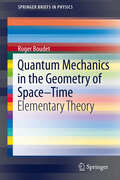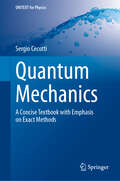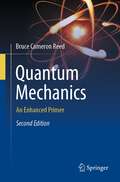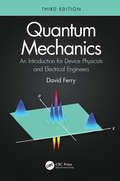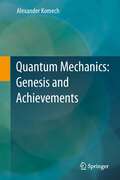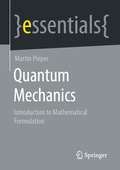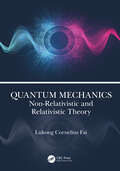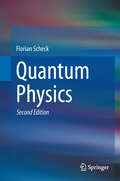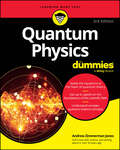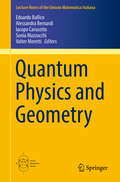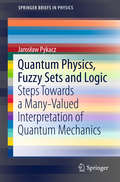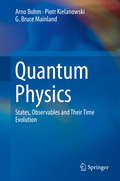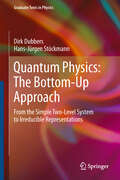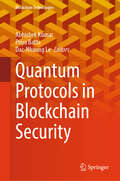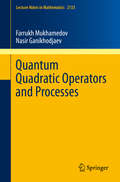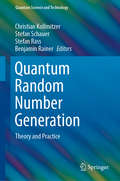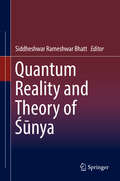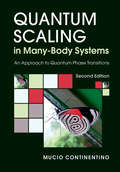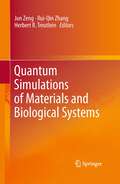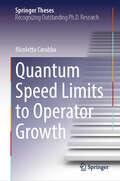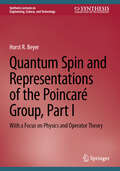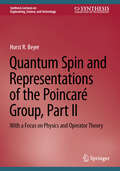- Table View
- List View
Quantum Mechanics in the Geometry of Space-Time
by Roger BoudetThis book continues the fundamental work of Arnold Sommerfeld and David Hestenes formulating theoretical physics in terms of Minkowski space-time geometry. We see how the standard matrix version of the Dirac equation can be reformulated in terms of a real space-time algebra, thus revealing a geometric meaning for the "number i" in quantum mechanics. Next, it is examined in some detail how electroweak theory can be integrated into the Dirac theory and this way interpreted in terms of space-time geometry. Finally, some implications for quantum electrodynamics are considered. The presentation of real quantum electromagnetism is expressed in an addendum. The book covers both the use of the complex and the real languages and allows the reader acquainted with the first language to make a step by step translation to the second one.
Quantum Mechanics: A Concise Textbook with Emphasis on Exact Methods (UNITEXT for Physics)
by Sergio CecottiThis advanced introductory textbook offers a comprehensive approach to non-relativistic Quantum Mechanics, focusing on exact methods and mathematical techniques often overlooked in standard textbooks. Bridging the gap between foundational concepts and advanced topics, this book introduces numerous methods—some of which are entirely new—making it an invaluable resource for students and researchers alike. Key topics include open quantum systems, entanglement, and supersymmetry, providing a modern perspective on the subject. With eight in-depth chapters, it covers: Quantum Mechanics: A New Paradigm Hilbert Space Formulation of Quantum Physics Schrödinger Equation I Symmetry, Angular Momentum, and Statistics Schrödinger Equation II Path Integrals Quantum Entanglement Methods, Techniques, and Approximation Schemes Perfect for those seeking a deeper understanding of quantum mechanics beyond the basics, this textbook combines theory with practical mathematical methods to present the full scope of the subject’s complexity.
Quantum Mechanics: An Enhanced Primer
by Bruce Cameron ReedQuantum mechanics is one of the most fascinating elements of the physics curriculum, but its conceptual nuances and mathematical complexity can be daunting for beginning students. This user-friendly text is designed for a one-semester course which bridges the gap between sophomore-level treatments and advanced undergraduate/lower-graduate courses. Qualitative explanations and descriptions of historical background are combined with detailed mathematical analyses to help students establish a firm foundation for further study. Classical problems such potential wells, barrier penetration, alpha decay, the harmonic oscillator, and the hydrogen atom are examined in detail, and formalisms and techniques such as operators, expectation values, commutators, perturbation theory, numerical solutions, and the variational theorem are also covered. Particular emphasis is placed on providing numerous worked examples and exercises.
Quantum Mechanics: An Introduction for Device Physicists and Electrical Engineers
by David FerryQuantum Mechanics: An Introduction for Device Physicists and Electrical Engineers, Third Edition provides a complete course in quantum mechanics for students of semiconductor device physics and electrical engineering. It provides the necessary background to quantum theory for those starting work on micro- and nanoelectronic structures and is particularly useful for those beginning work with modern semiconductors devices, lasers, and qubits. This book was developed from a course the author has taught for many years with a style and order of presentation of material specifically designed for this audience. It introduces the main concepts of quantum mechanics which are important in everyday solid-state physics and electronics. Each topic includes examples which have been carefully chosen to draw upon relevant experimental research. It also includes problems with solutions to test understanding of theory. Full updated throughout, the third edition contains the latest developments, experiments, and device concepts, in addition to three fully revised chapters on operators and expectations and spin angular momentum, it contains completely new material on superconducting devices and approaches to quantum computing.
Quantum Mechanics: Genesis and Achievements
by Alexander KomechThe focus of the present work is nonrelativistic and relativistic quantum mechanics with standard applications to the hydrogen atom. The author has aimed at presenting quantum mechanics in a comprehensive yet accessible for mathematicians and other non-physicists. The genesis of quantum mechanics, its applications to basic quantum phenomena, and detailed explanations of the corresponding mathematical methods are presented. The exposition is formalized (whenever possible) on the basis of the coupled Schroedinger, Dirac and Maxwell equations. Aimed at upper graduate and graduate students in mathematical and physical science studies.
Quantum Mechanics: Introduction to Mathematical Formulation (essentials)
by Martin PieperAnyone who has always wanted to understand the hieroglyphs on Sheldon's blackboard in the television series The Big Bang Theory or who wanted to know exactly what the fate of Schrödinger's cat is all about will find a short, descriptive introduction to the world of quantum mechanics in this essential . In particular, the text focuses on the mathematical description in the Hilbert space. The content goes beyond popular scientific presentations, but is nevertheless suitable for readers without special prior knowledge thanks to the clear examples. This Springer essential is a translation of the original German 1st edition essentials, Quantenmechanik by Martin Pieper published by Springer Fachmedien Wiesbaden GmbH, part of Springer Nature in 2019.The translation was done with the help of artificial intelligence (machine translation by the service DeepL.com). A subsequent human revision was done primarily in terms of content, so that the book will read stylistically differently from a conventional translation. Springer Nature works continuously to further the development of tools for the production of books and on the related technologies to support the authors.The author:Prof. Dr. Martin Pieper has been Professor of Mathematics and Simulation at the FH Aachen since 2011. Before he was appointed to the FH Aachen, he was a research assistant in the Optimization department of the Fraunhofer Institute for Industrial Mathematics.
Quantum Mechanics: Non-Relativistic and Relativistic Theory
by Lukong Cornelius FaiThis book presents an accessible treatment of non-relativistic and relativistic quantum mechanics. It is an ideal textbook for undergraduate and graduate physics students, and is also useful to researchers in theoretical physics, quantum mechanics, condensed matter, mathematical physics, quantum chemistry, and electronics. This student-friendly and self-contained textbook covers the typical topics in a core undergraduate program, as well as more advanced, graduate-level topics with an elegant mathematical rigor, contemporary style, and rejuvenated approach. It balances theory and worked examples, which reinforces readers' understanding of fundamental concepts. The analytical methods employed in this book describe physical situations with mathematical rigor and in-depth clarity, emphasizing the essential understanding of the subject matter without need for prior knowledge of classical mechanics, electromagnetic theory, atomic structure, or differential equations. Key Features: • Remains accessible but incorporates a rigorous, updated mathematical treatment• Laid out in a student-friendly structure• Balances theory with its application through examples Lukong Cornelius Fai is a professor of theoretical physics at the Department of Physics, Faculty of Sciences, University of Dschang, Cameroon. He is Head of Condensed Matter and Nanomaterials as well as the Mesoscopic and Multilayer Structures Laboratory. He was formerly a senior associate at the Abdus Salam International Centre for Theoretical Physics (ICTP), Italy. He holds a Master of Science in Physics and Mathematics (1991) as well as a Doctor of Science in Physics and Mathematics (1997) from Moldova State University. He is the author of over 170 scientific publications and five textbooks.
Quantum Models of Cognition and Decision
by Jerome R. Busemeyer Peter D. BruzaMuch of our understanding of human thinking is based on probabilistic models. This innovative book by Jerome R. Busemeyer and Peter D. Bruza argues that, actually, the underlying mathematical structures from quantum theory provide a much better account of human thinking than traditional models. They introduce the foundations for modelling probabilistic-dynamic systems using two aspects of quantum theory. The first, 'contextuality', is a way to understand interference effects found with inferences and decisions under conditions of uncertainty. The second, 'quantum entanglement', allows cognitive phenomena to be modeled in non-reductionist ways. Employing these principles drawn from quantum theory allows us to view human cognition and decision in a totally new light. Introducing the basic principles in an easy-to-follow way, this book does not assume a physics background or a quantum brain and comes complete with a tutorial and fully worked-out applications in important areas of cognition and decision.
Quantum Monte Carlo Methods: Algorithms for Lattice Models
by J. E. Gubernatis N. Kawashima P. WernerFeaturing detailed explanations of the major algorithms used in quantum Monte Carlo simulations, this is the first textbook of its kind to provide a pedagogical overview of the field and its applications. The book provides a comprehensive introduction to the Monte Carlo method, its use, and its foundations, and examines algorithms for the simulation of quantum many-body lattice problems at finite and zero temperature. These algorithms include continuous-time loop and cluster algorithms for quantum spins, determinant methods for simulating fermions, power methods for computing ground and excited states, and the variational Monte Carlo method. Also discussed are continuous-time algorithms for quantum impurity models and their use within dynamical mean-field theory, along with algorithms for analytically continuing imaginary-time quantum Monte Carlo data. The parallelization of Monte Carlo simulations is also addressed. This is an essential resource for graduate students, teachers, and researchers interested in quantum Monte Carlo techniques.
Quantum Phase Transitions
by Subir SachdevDescribing the physical properties of quantum materials near critical points with long-range many-body quantum entanglement, this book introduces readers to the basic theory of quantum phases, their phase transitions and their observable properties. This second edition begins with a new section suitable for an introductory course on quantum phase transitions, assuming no prior knowledge of quantum field theory. It also contains several new chapters to cover important recent advances, such as the Fermi gas near unitarity, Dirac fermions, Fermi liquids and their phase transitions, quantum magnetism, and solvable models obtained from string theory. After introducing the basic theory, it moves on to a detailed description of the canonical quantum-critical phase diagram at non-zero temperatures. Finally, a variety of more complex models are explored. This book is ideal for graduate students and researchers in condensed matter physics and particle and string theory.
Quantum Physics
by Florian ScheckScheck's Quantum Physics presents a comprehensive introductory treatment, ideally suited for a two-semester course. Part One covers the basic principles and prime applications of quantum mechanics, from the uncertainty relations to many-body systems. Part Two introduces to relativistic quantum field theory and ranges from symmetries in quantum physics to electroweak interactions. Numerous worked-out examples as well as exercises, with solutions or hints, enables the book's use as an accompanying text for courses, and also for independent study. For both parts, the necessary mathematical framework is treated in adequate form and detail. The book ends with appendices covering mathematical fundamentals and enrichment topics, plus selected biographical notes on pioneers of quantum mechanics and quantum field theory. The new edition was thoroughly revised and now includes new sections on quantization using the path integral method and on deriving generalized path integrals for bosonic and fermionic fields.
Quantum Physics For Dummies
by Andrew Zimmerman JonesThe plain-English guide to understanding quantum physics Mastering quantum physics is no easy feat, but with the help of Quantum Physics For Dummies you can work at your own pace to unlock key concepts and fascinating facts. Packed with invaluable explanations, equations, and step-by-step instructions, this book makes a challenging subject much more accessible. Great for college students taking a quantum physics course, Quantum Physics For Dummies offers complete coverage of the subject, along with numerous examples to help you tackle the tough stuff. The Schrodinger Equation, the foundations of quantum physics, vector notation, scattering theory, angular momentum—it’s all in here. This handy guide helps you prepare for exams and succeed at learning quantum physics. Get clear explanations of the core concepts in quantum physics Review the math principles needed for quantum physics equations Learn the latest breakthroughs and research in the field Clarify difficult subjects and equations from your college courseQuantum Physics For Dummies is great a resource for students who need a supplement to the textbook to help them tackle this challenging subject.
Quantum Physics and Geometry (Lecture Notes of the Unione Matematica Italiana #25)
by Valter Moretti Edoardo Ballico Alessandra Bernardi Iacopo Carusotto Sonia MazzucchiThis book collects independent contributions on current developments in quantum information theory, a very interdisciplinary field at the intersection of physics, computer science and mathematics. Making intense use of the most advanced concepts from each discipline, the authors give in each contribution pedagogical introductions to the main concepts underlying their present research and present a personal perspective on some of the most exciting open problems. Keeping this diverse audience in mind, special efforts have been made to ensure that the basic concepts underlying quantum information are covered in an understandable way for mathematical readers, who can find there new open challenges for their research. At the same time, the volume can also be of use to physicists wishing to learn advanced mathematical tools, especially of differential and algebraic geometric nature.
Quantum Physics, Fuzzy Sets and Logic
by Jarosław PykaczThis Brief presents steps towards elaborating a new interpretation of quantum mechanics based on a specific version of Łukasiewicz infinite-valued logic. It begins with a short survey of main interpretations of quantum mechanics already proposed, as well as various models of many-valued logics and previous attempts to apply them for the description of quantum phenomena. The prospective many-valued interpretation of quantum mechanics is soundly based on a theorem concerning the isomorphic representation of Birkhoff-von Neumann quantum logic in the form of a special Łukasiewicz infinite-valued logic endowed with partially defined conjunctions and disjunctions.
Quantum Physics: States, Observables and Their Time Evolution (Texts And Monographs In Physics #348)
by Piotr Kielanowski Arno Bohm G. Bruce MainlandThis is an introductory graduate course on quantum mechanics, which is presented in its general form by stressing the operator approach. Representations of the algebra of the harmonic oscillator and of the algebra of angular momentum are determined in chapters 1 and 2 respectively. The algebra of angular momentum is enlarged by adding the position operator so that the algebra can be used to describe rigid and non-rigid rotating molecules. The combination of quantum physical systems using direct-product spaces is discussed in chapter 3. The theory is used to describe a vibrating rotator, and the theoretical predictions are then compared with data for a vibrating and rotating diatomic molecule. The formalism of first- and second-order non-degenerate perturbation theory and first-order degenerate perturbation theory are derived in chapter 4. Time development is described in chapter 5 using either the Schroedinger equation of motion or the Heisenberg’s one. An elementary mathematical tutorial forms a useful appendix for the readers who don’t have prior knowledge of the general mathematical structure of quantum mechanics.
Quantum Physics: The Bottom-Up Approach
by Dirk Dubbers Hans-Jürgen StöckmannThis concise tutorial provides the bachelor student and the practitioner with a short text on quantum physics that allows them to understand a wealth of quantum phenomena based on a compact, well readable, yet still concise and accurate description of nonrelativistic quantum theory. This "quadrature of the circle" is achieved by concentrating first on the simplest quantum system that still displays all basic features of quantum theory, namely, a system with only two quantized energy levels. For most readers it is very helpful to understand such simple systems before slowly proceeding to more demanding topics like particle entanglement, quantum chaos, or the use of irreducible tensors. This tutorial does not intend to replace the standard textbooks on quantum mechanics, but will help the average student to understand them, often for the first time.
Quantum Protocols in Blockchain Security (Blockchain Technologies)
by Abhishek Kumar Dac-Nhuong Le Priya BattaThis book highlights the intersection of quantum computing and blockchain technology, addressing the urgent need for enhanced security measures in a post-quantum world. This book provides a comprehensive overview of fundamental quantum concepts, the vulnerabilities of classical cryptography, and the innovative solutions that quantum protocols offer. Each chapter delves into topics such as quantum key distribution, post-quantum cryptography, and secure smart contracts, highlighting real-world applications and challenges in implementing decentralized quantum networks. By merging theoretical insights with practical strategies, this book equips researchers, developers, and industry professionals.
Quantum Quadratic Operators and Processes
by Farrukh Mukhamedov Nasir GanikhodjaevCovering both classical and quantum approaches, this unique and self-contained book presents the most recent developments in the theory of quadratic stochastic operators and their Markov and related processes. The asymptotic behavior of dynamical systems generated by classical and quantum quadratic operators is investigated and various properties of quantum quadratic operators are studied, providing an insight into the construction of quantum channels. This book is suitable as a textbook for an advanced undergraduate/graduate level course or summer school in quantum dynamical systems. It can also be used as a reference book by researchers looking for interesting problems to work on, or useful techniques and discussions of particular problems. Since it includes the latest developments in the fields of quadratic dynamical systems, Markov processes and quantum stochastic processes, researchers at all levels are likely to find the book inspiring and useful.
Quantum Random Number Generation: Theory and Practice (Quantum Science and Technology)
by Stefan Rass Stefan Schauer Christian Kollmitzer Benjamin RainerThis book provides an overview of state-of-the-art implementations of quantum random number generators (QRNGs), and especially examines their relation to classical statistical randomness models and numerical techniques for computing random numbers. The reader – who ideally has a background in classical statistics, computer science, or cryptography – is introduced to the world of quantum bits step by step, and explicit relations between QRNGs and their classical counterparts are identified along the way. Random number generation is a major pillar of cryptography. Capitalizing on the randomness inherent in quantum phenomena is a rapidly evolving branch of quantum cryptography with countless applications for the future. The value of quantum randomness for cryptographic purposes is empirically demonstrated in statistical evaluations of QRNGs’ performance compared to classical techniques for true and pseudorandom number generation. The book then provides an overview of technical implementations of QRNGs, before a concluding discussion of major achievements and remaining obstacles in the field rounds out the coverage, while also opening the door for future research directions.
Quantum Reality and Theory of Śūnya
by Siddheshwar Rameshwar BhattThe book deals with expounding the nature of Reality as it is understood in contemporary times in Quantum Physics. It also explains the classical Indian theory of Śūnya in its diverse facets. Thereafter it undertakes comparison between the two which is an area of great topical interest. It is a cross-disciplinary study by erudite Indian and western scholars between traditional Indian knowledge system and contemporary researches in Physical sciences. It points out how the theory of ‘Śūnyatā has many seminal ideas and theories in common with contemporary Quantum Physics. The learned authors have tried to dissolve the “mysteries” of Quantum Physics and resolved its “weird paradoxes” with the help of theory of Śūnyatā. The issue of non-separability or entanglement has been approached with the help of the Buddhist theory of Pratītyasamutpāda. The paradoxical situation of “wave-particle duality” has been explained with the help of Upaniṣadic theory of complementarity of the two opposites. The measurement problem represented by “Schrodinger’s cat” has been dealt with by resorting to two forms of the calculation of probabilities. Some writers have argued for Śūnyatā-like non-essentialist position to understand quantum reality. To make sense of quantum theory some papers provide a happy symbiosis of technical understanding and personal meditative experience by drawing multifarious parallels. This book will be of interest to philosophically inclined physicists and philosophers with interest in quantum mechanics.
Quantum Scaling In Many-body Systems
by Mucio ContinentinoThis book on quantum phase transitions has been written by one of the pioneers in the application of scaling ideas to many-body systems OCo a new and exciting subject that has relevance to many areas of condensed matter and theoretical physics. One of the few books on the subject, it emphasizes strongly correlated electronic systems. Although dealing with complex problems in statistical mechanics, it does not lose sight of the experiments and the actual physical systems which motivate the theoretical work. The book starts by presenting the scaling theory of quantum critical phenomena. Critical exponents for different systems are calculated using both the momentum space and real space renormalization group approaches. The former is developed without the use of Feynman diagrams, allowing nonspecialists to fully appreciate the underlying physics of this method. The case of heavy fermions as an example of systems close to a zero temperature phase transition is presented and discussed in detail. This is also the case of non-Fermi liquid behavior associated with a quantum critical point. MetalOCoinsulator transitions are discussed within the scaling approach. The book ends with a discussion on first order quantum phase transitions, in particular those which occur due to a fluctuation-induced mechanism. Contents: Scaling Theory of Quantum Critical Phenomena; Landau and Gaussian Theories; Renormalization Group: The A-Expansion; Quantum Phase Transitions; Real Space Renormalization Group Approach; Heavy Fermions; A Microscopic Model for Heavy Fermions; MetalOCoInsulator Transitions; Density-Driven MetalOCoInsulator Transitions; Mott Transitions; The Nonlinear Sigma Model; Fluctuation-Induced Quantum Phase Transitions. Readership: Graduate students, lecturers and researchers in condensed matter physics. "
Quantum Simulations of Materials and Biological Systems
by Rui-Qin Zhang Jun Zeng Herbert TreutleinQuantum Simulations of Materials and Biological Systems features contributions from leading world experts in the fields of density functional theory (DFT) and its applications to material and biological systems. The recent developments of correlation functionals, implementations of Time-dependent algorithm into DFTB+ method are presented. The applications of DFT method to large materials and biological systems such as understanding of optical and electronic properties of nanoparticles, X-ray structure refinement of proteins, the catalytic process of enzymes and photochemistry of phytochromes are detailed. In addition, the book reviews the recent developments of methods for protein design and engineering, as well as ligand-based drug design. Some insightful information about the 2011 International Symposium on Computational Sciences is also provided. Quantum Simulations of Materials and Biological Systems is aimed at faculties and researchers in the fields of computational physics, chemistry and biology, as well as at the biotech and pharmaceutical industries.
Quantum Speed Limits to Operator Growth (Springer Theses)
by Nicoletta CarabbaThis book introduces universal bounds to quantum unitary dynamics, with applications ranging from condensed matter models to quantum metrology and computation. Motivated by the observation that the dynamics of many-body systems can be better unraveled in the Heisenberg picture, we focus on the unitary evolution of quantum observables, a process known as operator growth and quantified by the Krylov complexity. By means of a generalized uncertainty relation, we constrain the complexity growth through a universal speed limit named the dispersion bound, investigating also its relation with quantum chaos. Furthermore, the book extends the framework of quantum speed limits (QSLs) to operator flows, identifying new fundamental timescales of physical processes. Crucially, the dynamics of operator complexity attains the QSL whenever the dispersion bound is saturated. Our results provide computable constraints on the linear response of many-body systems out of equilibrium and the quantum Fisher information governing the precision of quantum measurements.
Quantum Spin and Representations of the Poincaré Group, Part I: With a Focus on Physics and Operator Theory (Synthesis Lectures on Engineering, Science, and Technology)
by Horst R. BeyerThis book discusses how relativistic quantum field theories must transform under strongly continuous unitary representations of the Poincaré group. The focus is on the construction of the representations that provide the basis for the formulation of current relativistic quantum field theories of scalar fields, the Dirac field, and the electromagnetic field. Such construction is tied to the use of the methods of operator theory that also provide the basis for the formulation of quantum mechanics, up to the interpretation of the measurement process. In addition, since representation spaces of primary interest in quantum theory are infinite dimensional, the use of these methods is essential. Consequently, the book also calculates the generators of relevant strongly continuous one-parameter groups that are associated with the representations and, where appropriate, the corresponding spectrum. Part I of Quantum Spin and Representations of the Poincaré Group specifically addresses: conventions; basic properties of SO(2) and SO(3); construction of a double cover of SO(3); SU(2) spinors; continuous unitary representation of SU(2); basic properties of the Lorentz Group; unitary representation of the restricted Lorentz Group; an extension to a strongly continuous representation of the restricted Poincaré Group; and an extension to a unitary/anti-unitary representation of the Poincaré Group.
Quantum Spin and Representations of the Poincaré Group, Part II: With a Focus on Physics and Operator Theory (Synthesis Lectures on Engineering, Science, and Technology)
by Horst R. BeyerThis book discusses how relativistic quantum field theories must transform under strongly continuous unitary representations of the Poincaré group. The focus is on the construction of the representations that provide the basis for the formulation of current relativistic quantum field theories of scalar fields, the Dirac field, and the electromagnetic field. Such construction is tied to the use of the methods of operator theory that also provide the basis for the formulation of quantum mechanics, up to the interpretation of the measurement process. In addition, since representation spaces of primary interest in quantum theory are infinite dimensional, the use of these methods is essential. Consequently, the book also calculates the generators of relevant strongly continuous one-parameter groups that are associated with the representations and, where appropriate, the corresponding spectrum. Part II of Quantum Spin and Representations of the Poincaré Group specifically addresses: construction of a double cover of the restricted Lorentz Group; Weyl spinors; Weyl representation of SL(2, C); an extension to a strongly continuous representation of a semi-direct product of R^4 and SL(2, C); Dirac spinors; Dirac fields; Dirac equation; Spin 1 representations of SL(2, C); Maxwell fields; and Maxwell's equations.
